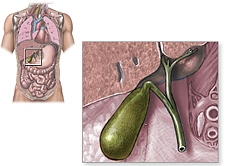Cholecystitis
Contents
When to Contact a Medical Professional
Chronic cholecystitis is swelling and irritation of the gallbladder that persists over time.
The gallbladder is a sac located under the liver. It stores bile that is made in the liver. Bile helps the intestines digest fats.

Causes
Chronic cholecystitis is usually caused by repeated attacks of acute (sudden) cholecystitis. Most of these attacks are caused by gallstones in the gallbladder.
These attacks cause the walls of the gallbladder to thicken. The gallbladder begins to shrink. Over time, the gallbladder is less able to concentrate, store, and release bile.
The disease occurs more often in women than in men, especially after age 40.
Symptoms
For symptoms of acute cholecystitis, see: Acute cholecystitis.
Acute cholecystitis is a painful condition that leads to chronic cholecystitis. It is not clear whether chronic cholecystitis causes any symptoms.
Exams and Tests
Your health care provider may order the following blood tests:
- Amylase and lipase -- to diagnose diseases of the pancreas
- Complete blood count (CBC)
- Liver function tests -- to evaluate how well the liver is working
Tests that reveal gallstones or inflammation in the gallbladder include:
- Abdominal CT scan
- Abdominal ultrasound
- Gallbladder scan (HIDA scan)
- Oral cholecystogram
Treatment
Surgery is the usual treatment. Surgery to remove the gallbladder is called cholecystectomy.
- Laparoscopic cholecystectomy is most often done. This surgery uses smaller surgical cuts, which result in a faster recovery. Patients are often sent home from the hospital on the same day as surgery, or the next morning.
- Open cholecystectomy requires a larger cut in the upper-right part of the abdomen.
In patients who are too ill to have surgery because of other diseases or conditions, the gallstones may be dissolved with medication taken by mouth. However, this may take 2 years or longer to work, and the stones may return after treatment.
Outlook (Prognosis)
Cholecystectomy is a common procedure with a low risk.
Possible Complications
- Cancer of the gallbladder (rarely)
- Jaundice
- Pancreatitis
- Worsening of the condition
When to Contact a Medical Professional
Call for an appointment with your health care provider if you develop any symptoms of cholecystitis.
Prevention
The condition is not always preventable. Eating less fatty foods may relieve symptoms in people with acute cholecystitis who have not had their gallbladder removed. However, the benefit of a low-fat diet has not been proven.
Source: http://www.nlm.nih.gov/medlineplus/ency/article/000217.htm

